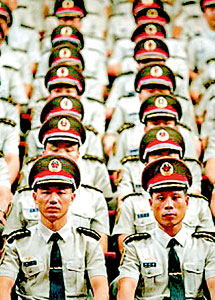Chinese military spending will rise by a massive 12.7 per cent this year, Beijing has announced.
The decision is the latest sign of the country's growing assertiveness -- a development stirring unease among its neighbours and the United States.
In the past year, China has clashed with Japan over disputed islands and had rows with Washington over trade and human rights.
Parliamentary spokesman Li Zhaoxing said the defence budget would be 601.1 billion yuan (£56.3 billion) in 2011, up from 532.1 billion yuan (£49.9 billion) last year. The budget went up by 7.5 percent in 2010 following a series of double-digit hikes.
 |
| China says its defence spending is small compared to the U.S. and its upgrades are for defence |
Many experts believe actual spending on the 2.3 million-strong People's Liberation Army is far higher than claimed.
However, China, which recently became the world's second-largest economy, points out that its defence spending is much lower than that of the US.
Last month the Pentagon rolled out a record budget of $553billion, or £340billion. Beijing has made some eye-catching moves in the military sphere, not least in conducting its first test flight of a stealth fighter jet when US defence secretary Robert Gates visited in January.
It could also launch its first aircraft carrier this year, earlier than expected. 'The PLA is an important and powerful force in decision-making and there is obviously a desire to signal ... that China is going to continue to get stronger,' said Rory Medcalf of the Lowy Institute, an Australian think-tank. This week, Japan scrambled military jets when Chinese planes flew near disputed islands in the East China Sea. That signal may prompt greater wariness from neighbours.
The Philippines also demanded an explanation from China over an incident on Wednesday in a disputed area in the South China Sea, where it says two Chinese patrol boats threatened to ram a survey ship.
Indeed, other nations are upgrading their forces in response to China's build-up. India increased annual defence spending by about 11.6 percent this week and is shopping for advanced fighter jets, transport aircraft, surveillance helicopters and submarines.
Some officials in Taiwan are especially alarmed. China has around 1,400 missiles aimed at the island, according to the Taipei government. China has vowed to bring the democratically ruled island under mainland rule, by force if necessary.
'China's military power is now growing quickly,' said Lin Yu-Fang, a member of the Taiwan parliament's defence committee in response to the Chinese budget number. 'The United States should help us turn the situation around, and we hope European countries will also sell us advanced weapons.' Chinese parliament spokesman Li said the military spending rise was justified. China posed no threat to anyone, he added.
'China's defence spending is relatively low by world standards,' he said. 'China has always paid attention to restraining defence spending.'
Andy Gilholm, senior China analyst for risk consultancy Control Risks, said China was not trying to rival US global power projection but wanted to make it harder for Washington to impose its might in what China considers its own 'backyard'.
'The key issue for the US and its regional allies is not the gap in spending or overall capabilities, but the extent to which China could potentially threaten or constrain US ability to use its military dominance to help support its goals in the region,' Gilholm said.
China's loud, renewed claims to a vast swathe of waters and mostly uninhabited islets in the South China Sea, along with the expansion of its military presence there, rattled Southeast Asian nations in 2010.
Relations between China and Japan also chilled last year when Japan detained the Chinese skipper of a boat that crashed into its ships near disputed isles in the East China Sea, the site of vast potential gas and oil reserves.
Still, a retired Chinese military officer, Xu Guangyu, said the spending rise was needed to cope with inflation, which was eating into pay cheques and equipment outlays.
'In the next two years the wages of some military personnel will have to rise relatively quickly, because inflation is quite high,' said Xu.'Military equipment, uniforms and logistics are all feeling the pressure of price rises.' © Daily Mail, London
|


